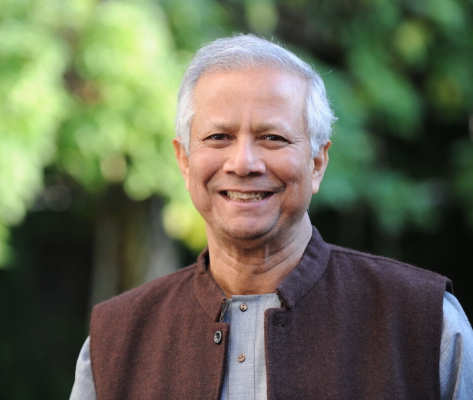Prof. Dr. Muhammad Yunus is a Bangladeshi social entrepreneur, economist, and Nobel Peace Prize laureate known worldwide for pioneering the concept of microfinance and establishing the Grameen Bank, which has helped millions of impoverished people, particularly women, access small loans to start businesses and improve their lives. Born on June 28, 1940, in the town of Chittagong, Bangladesh, Yunus' contributions to the fight against poverty and his revolutionary work in finance have earned him recognition as one of the most influential global advocates for social business and economic empowerment.
Early Life and Education
Muhammad Yunus was born into a middle-class family, and from a young age, he was motivated by a strong sense of social justice and a desire to alleviate poverty. He completed his undergraduate studies in Economics at Dhaka University in Bangladesh, and then went on to study in the United States, earning a Master’s degree and a Ph.D. in Economics from Vanderbilt University in 1969. After completing his Ph.D., Yunus returned to Bangladesh and became a professor at Chittagong University, where he began to challenge conventional economic thinking and explore new ways to help the poor.
Grameen Bank and Microfinance
Yunus' most groundbreaking work began in the 1970s when he was teaching at Chittagong University. He became deeply aware of the severe poverty in his community and was troubled by the fact that traditional banks refused to lend money to the poor because they lacked collateral. In 1976, while working on a project that aimed to help rural artisans, Yunus took a simple but radical step: he lent $27 of his own money to 42 poor women in a nearby village, enabling them to buy materials to produce handicrafts. This small loan allowed them to lift themselves out of poverty and repay the money over time.
Yunus realized that access to capital was one of the most significant barriers preventing the poor from escaping poverty, and thus, the idea of microcredit was born. Over the years, Yunus expanded this idea, eventually establishing the Grameen Bank in 1983, a bank that focused specifically on providing small, collateral-free loans to the rural poor, especially women. The Grameen Bank's success was unprecedented: it demonstrated that even the poorest people, without access to traditional banking services, could repay loans if given the opportunity to use them to generate income.
Nobel Peace Prize and Global Impact
In 2006, Yunus and the Grameen Bank were jointly awarded the Nobel Peace Prize for their efforts to create economic and social development from below. The Nobel Committee recognized their work as an example of how grassroots economic initiatives could help eliminate poverty and empower individuals, especially women, to become financially independent and contribute to their communities.
The concept of microfinance, which Yunus championed, has since spread globally and has been adopted by countless organizations and governments as a way to fight poverty. His work has influenced the development of social entrepreneurship, a field that focuses on creating businesses and models that address social and environmental issues while still generating sustainable profits.
Social Business and Advocacy
Beyond microfinance, Yunus has been a passionate advocate for the idea of social business—a new way of conducting business that addresses social issues, such as health care, education, and clean energy, while being financially self-sustaining. He believes that businesses should not only be driven by profit but also by a sense of responsibility to the communities they serve. His social business model emphasizes the importance of creating sustainable businesses that solve social problems and that any profits generated are reinvested into the business itself rather than distributed as dividends.
Muhammad Yunus has also authored several books on poverty alleviation, microfinance, and social business, including his well-known work "Banker to the Poor" (1999), in which he outlines his journey and the principles behind Grameen Bank. His ideas have inspired countless entrepreneurs, philanthropists, and policymakers to think differently about the relationship between business, poverty, and development.
Awards and Recognition
In addition to the Nobel Peace Prize, Yunus has received numerous accolades and honors for his pioneering work, including honorary degrees from universities around the world, the President's Medal from the United States, and being named one of Time magazine's 100 most influential people. He has been awarded honorary citizenship in several countries and is regarded as a leading authority in the field of social entrepreneurship.
Legacy and Continuing Work
As of today, Muhammad Yunus remains actively engaged in promoting social business and microfinance across the globe. He continues to speak at international forums, provide advisory services to governments and organizations, and lead various initiatives aimed at eradicating poverty and fostering inclusive economic growth.
Yunus' legacy is not just in the institutions he has created but also in the millions of lives that have been touched by the work of Grameen Bank and the global microfinance movement. His ideas have fundamentally changed how we view poverty and the role that financial systems can play in overcoming it.


